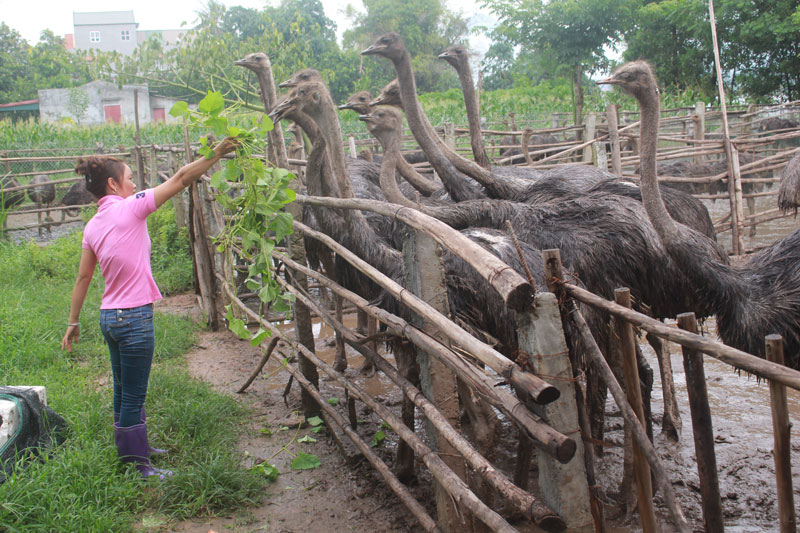
(HBO) - "Camel bird" is another name for an ostrich type that Phan Sy Hai and his wife Le Hai Yen raised in their farm at My village, Yen Mong commune, Hoa Binh city. Though they both have their own job, the couple took to raising this ostrich species in the hope of improving their income.

The ostrich farm of
Le Hai Yen and her husband in My village, Yen Mong commune, Hoa Binh city
generates a stable income of 100 – 150 million VND per year
In 2012, Yen’s
family bought six ostriches weighing 5-7kg each at 2 million VND each. They
then had to give up keeping the animals as they did not have enough land while
their children were young at the time. Three years later, the couple spent over
30 million VND to lease a 1,000 sq.m land plot and raised 30 ostriches. Seeing
that the birds grew well, required little care while adapting well to weather
conditions and resisting to diseases, Yen and her husband gradually increased
the flock to 60-100 heads, or even
200 in peak time. Currently, the farm has 120 birds
for meat and six for egg laying.
Yen said: "My family
raises ostriches mainly for meat and egg for sale. Female ostrich can lay eggs
when they reach 18-20 months old, but due to the lack of incubators and technique,
we now cannot hatch eggs to sell young birds. Therefore, we mainly raise the
bird for meat.” Yen now sells ostrich meat to local restaurants and at Nghia
Phuong and Tan Thanh markets. The prices of ostrich meat range from 100,000 –
250,000 VND per kg, 80-85,000 VND per kg for live bird and 250,000 – 280,000
VND per kg of ostrich meat pie. Each week, she sells two ostriches on Saturday
and Sunday or more when consumers place order. During peak time such as New
Year holiday or festivals, her farm sells four ostriches per day. With
affordable prices and fresh quality, the meat is becoming popular.
Yen stressed that
ostrich meat is organic, adding: "We feed the birds grass, water morning glory
and water-fern. During the raising process, the feed must be mixed in correct
ratio. When the birds are young, they should be fed with chicken feed, and when
they are bigger, we use grass and maize powder. While cleaning the farm, all
sharp, pointed and hard items must be removed to prevent the birds from eating them.
I buy young birds during January – June, around 100 heads each time”.
Yen and her husband
learnt how to raise ostriches from sellers or on the Internet. At the outset,
they met a lot of difficulties. Yen said: "Apart from limited capital, a lack
of experience worried us most. During transportation, many birds died along the
way. Little ones died due to weak resistance to diseases while bigger ones died
trampling upon each other. One time, I bought 12 ostriches but half of them
died on the way”. Learning from such experience, she transported the young
birds in small quantity at night in cool weather. The farm now earns her family a stable income
of 100 – 150 million VND a year, contributing to improving their livelihood./.
Since the beginning of this year, under the direction of the Department of Agriculture and Environment, the Sub-Department of Agricultural, Forestry, and Fishery Product Quality Management has strengthened the integration of the professional activities to promote and guide the organizations and individuals in the production and trading of agricultural, forestry, and fishery products to comply with the legal regulations regarding the use of chemicals, pesticides and veterinary medicines in crop cultivation, livestock farming and aquaculture. They also provide guidance to processing and manufacturing establishments on keeping the records to trace the product origins and using food additives from the approved list according to the regulations.
Hoa Binh province saw a significant rise in state budget revenue in the first two months of 2025, heard a meeting chaired by Vice Chairman of the provincial People’s Committee Quach Tat Liem.
Ha Thi Ha Chi, a 26-year-old graduate in law, has taken an unconventional path by returning to her hometown in Mai Chau district to establish the Tong Dau Cooperative, creating stable jobs for local women and bringing Thai ethnic brocade weaving to the global market.
As the Lunar New Year 2025 approached, pork prices surged, creating a profitable season for farmers in Tan Vinh commune, Luong Son district. Taking advantage of the rising demand, Can Minh Son, a farmer from Coi hamlet, sold over 30 pigs at 69,000 VND/kg, each weighing more than 100 kg. After deducting expenses, his family earned a profit of over 50 million VND.
alternate member of the Central Party Committee, Secretary of the Hoa Binh provincial Party Committee Nguyen Phi Long on March 5 had a working session with Yan Jiehe, Founder and Chairman of the China Pacific Construction Group, one of China's largest private corporations in the field of transport infrastructure. Deputy Secretary of the provincial Party Committee, Chairman of the provincial People's Committee Bui Duc Hinh and leaders of provincial departments and sectors also attended the working session.
The electronic printed circuit board (PCB) manufacturing and processing plant of Japan’s Meiko Group, located at Da River Left Bank Industrial Park in Hoa Binh city with a total investment of over 200 million USD, is expected to create thousands of jobs and make a significant contribution to the local budget.



